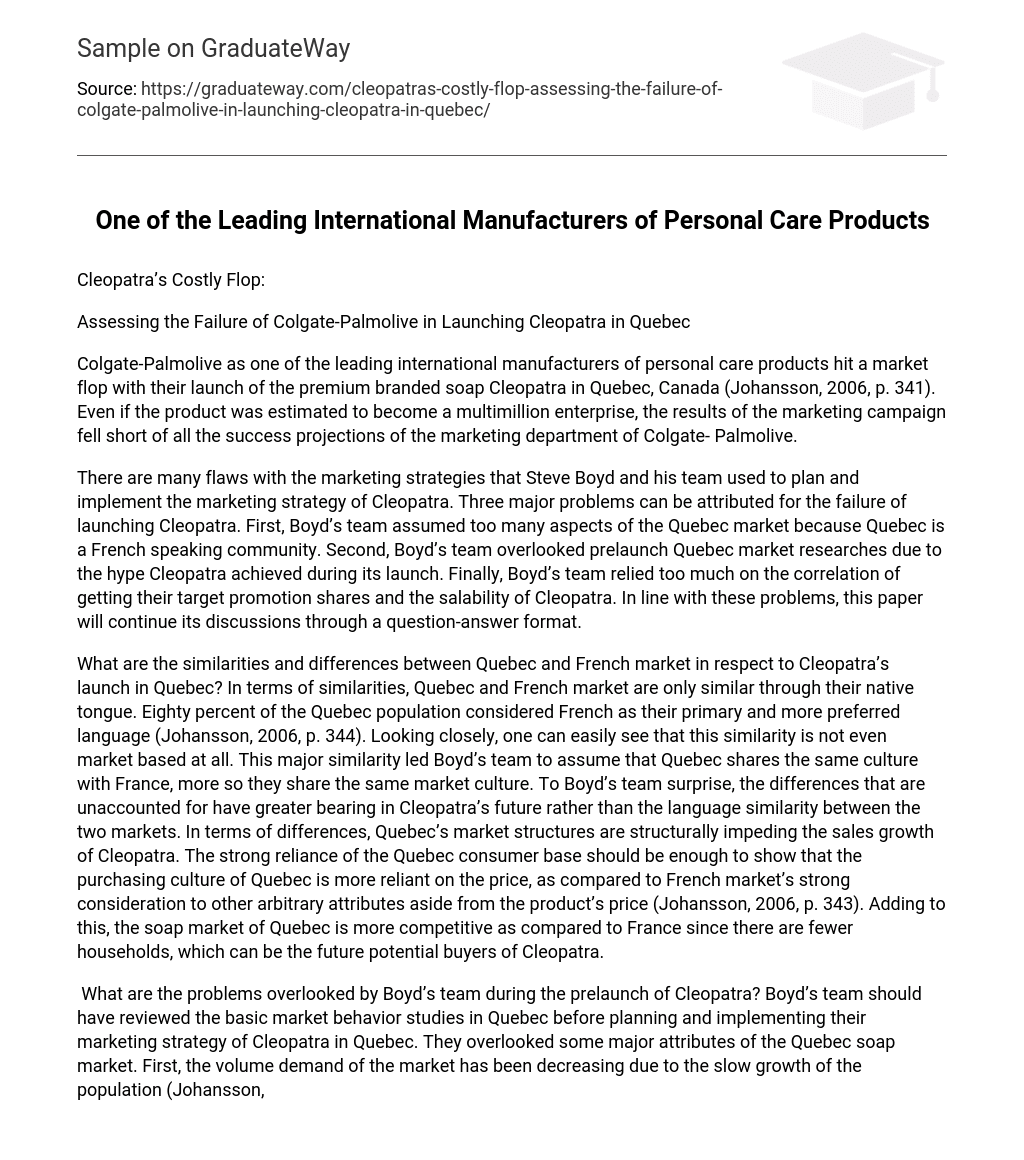Cleopatra’s Costly Flop:
Assessing the Failure of Colgate-Palmolive in Launching Cleopatra in Quebec
Colgate-Palmolive as one of the leading international manufacturers of personal care products hit a market flop with their launch of the premium branded soap Cleopatra in Quebec, Canada (Johansson, 2006, p. 341). Even if the product was estimated to become a multimillion enterprise, the results of the marketing campaign fell short of all the success projections of the marketing department of Colgate- Palmolive.
There are many flaws with the marketing strategies that Steve Boyd and his team used to plan and implement the marketing strategy of Cleopatra. Three major problems can be attributed for the failure of launching Cleopatra. First, Boyd’s team assumed too many aspects of the Quebec market because Quebec is a French speaking community. Second, Boyd’s team overlooked prelaunch Quebec market researches due to the hype Cleopatra achieved during its launch. Finally, Boyd’s team relied too much on the correlation of getting their target promotion shares and the salability of Cleopatra. In line with these problems, this paper will continue its discussions through a question-answer format.
What are the similarities and differences between Quebec and French market in respect to Cleopatra’s launch in Quebec? In terms of similarities, Quebec and French market are only similar through their native tongue. Eighty percent of the Quebec population considered French as their primary and more preferred language (Johansson, 2006, p. 344). Looking closely, one can easily see that this similarity is not even market based at all. This major similarity led Boyd’s team to assume that Quebec shares the same culture with France, more so they share the same market culture. To Boyd’s team surprise, the differences that are unaccounted for have greater bearing in Cleopatra’s future rather than the language similarity between the two markets. In terms of differences, Quebec’s market structures are structurally impeding the sales growth of Cleopatra. The strong reliance of the Quebec consumer base should be enough to show that the purchasing culture of Quebec is more reliant on the price, as compared to French market’s strong consideration to other arbitrary attributes aside from the product’s price (Johansson, 2006, p. 343). Adding to this, the soap market of Quebec is more competitive as compared to France since there are fewer households, which can be the future potential buyers of Cleopatra.
What are the problems overlooked by Boyd’s team during the prelaunch of Cleopatra? Boyd’s team should have reviewed the basic market behavior studies in Quebec before planning and implementing their marketing strategy of Cleopatra in Quebec. They overlooked some major attributes of the Quebec soap market. First, the volume demand of the market has been decreasing due to the slow growth of the population (Johansson, 2006, p. 343). Second, the nature of the market requires stealing of purchasing shares of the other products (Johansson, 2006, p. 343). Third, the Quebec consumers based their purchasing decisions more on the product’s price (Johansson, 2006, p. 343). Finally, discounted deals and bundle purchases are the trend in Quebec (Johansson, 2006, p. 343). All of these are unaccounted by Boyd by making more Cleopatra soaps than they could sell; by putting their product against institutionalized products such as Dove and Ivory; by exceeding the historical all time high pricing of Dove and by marketing Cleopatra to be the premium priced brand. All of these implemented Cleopatra marketing strategies when compared to the market culture of Quebec would result to being exactly opposite.
What does the research data shows? The research data that Colgate- Palmolive’s Cleopatra marketing team under Steve Boyd gathered simply shows that there are no correlation with their marketing strategies such as promotion and booming sales. The team was able to garner its projected share of advertisement by getting fifteen minutes of every one hundred minutes of advertisement time (Johansson, 2006, p. 345). Still, Cleopatra was not able to compete with other brands. It also fell along way below its projected 4.5% market share (Johansson, 2006, p. 346). Following the available data will lead to the generalization that product retention through promotion is not the deciding factor in the Quebec market. The consumers know Cleopatra; but they simply do not purchase it. Pricing and even effectiveness could be the reasons why Cleopatra flopped even if it was effectively advertised.
After raising and explaining these points; these paper deems that it was able to explain why Colgate-Palmolive’s Cleopatra flopped in the Quebec market; regardless of Quebec’s similarities with France wherein the product boomed.
Bibliography
Johansson, J. K. (2006). Global Marketing, 4th ed. Boston : McGraw-Hill.





